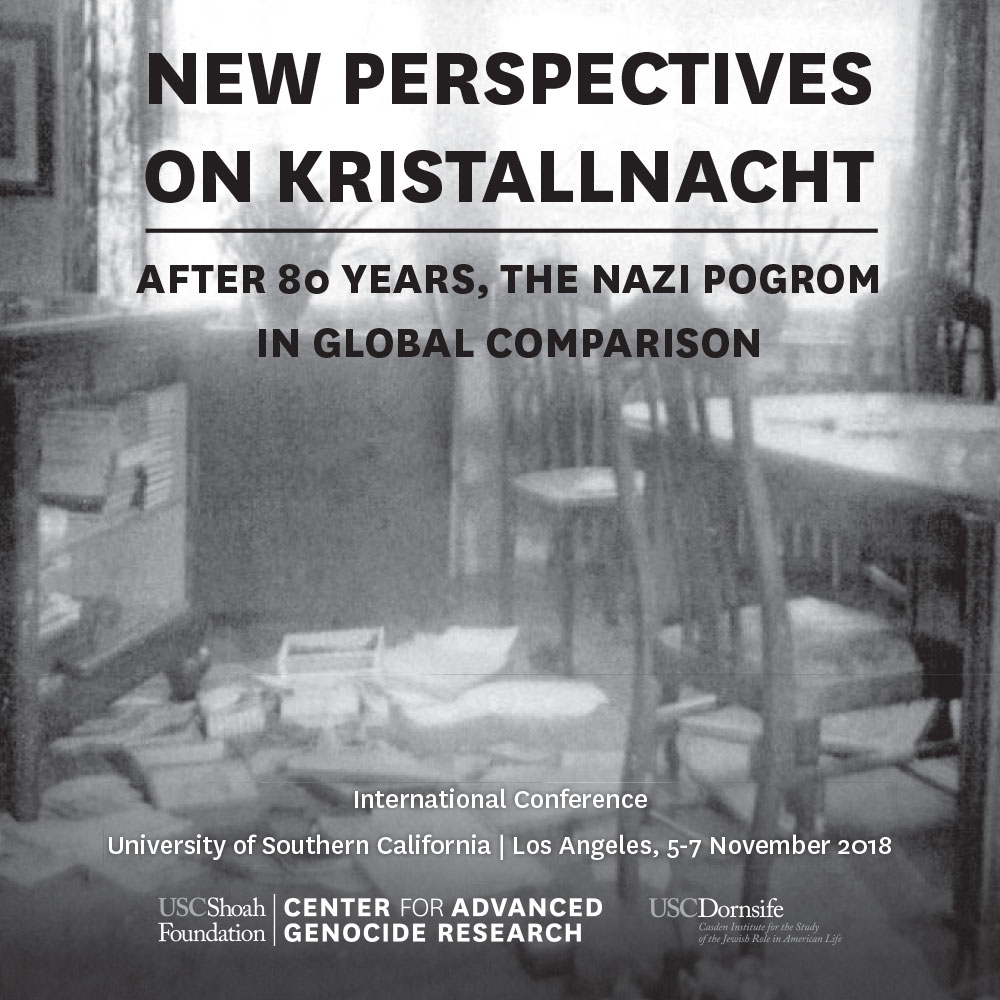Call for Papers: “New Perspectives on Kristallnacht: After 80 Years, The Nazi Pogrom in Global Comparison”

USC Shoah Foundation Center for Advanced Genocide Research and the USC Casden Institute for the Study of the Jewish Role in American Life invite proposals for their 2018 International Conference “New Perspectives on Kristallnacht: After 80 Years, the Nazi Pogrom in Global Comparison” that is being organized in cooperation with the Jack, Joseph and Morton Mandel Center for Advanced Holocaust Studies at the US Holocaust Memorial Museum, Washington, D.C., and the Center for Research on Antisemitism at the Technical University Berlin, Germany.
This conference, which convenes 80 years after the violent pogrom of 1938 against the Jews in Nazi Germany, aims to gather the most recent scholarship on the event itself. Conference presenters will explore the variety of responses to Kristallnacht within Germany, and in other parts of the world, as well as analyze comparisons of violent pogroms in world history. Thus, the conference shall help to situate this anti-Jewish pogrom in its close historical context, as well as in its place in world history.
Submissions on the following themes are particularly encouraged:
- New research on the pogrom, for example on its organization, violence and the impact on Jews and non-Jews in Germany and beyond
- New research on trials against pogrom perpetrators during the Third Reich and after 1945
- New research on the responses to the pogrom, for example Jewish reactions to Kristallnacht in Nazi Germany as well as Jewish and non-Jewish responses in the United States, Europe, Latin America, Asia, Africa, and Australia
- Comparative analyses, for example on the Nazi pogrom and other anti-Jewish pogroms in Europe before, during and after the Second World War; on pogroms and race riots against Jews and other minorities in other parts of the world; and on state sponsored pogroms vs. locally instigated pogroms
We welcome proposals for single paper presentations and for theme-specific panels comprising no more than three papers.
Please send a CV and a one-page abstract of the proposed paper, or an abstract of the proposed panel plus an abstract of each paper on the proposed panel by 15 August 2017 to both:
USC Shoah Foundation Center for Advanced Genocide Research: cagr@usc.edu
USC Casden Institute: sjross@usc.edu
Travel support will be available. Please include your travel request with your abstract.
Founded in 2014, the Center for Advanced Genocide Research is the research and scholarship unit of the USC Shoah Foundation. The USC Shoah Foundation Center for Advanced Genocide Research is dedicated to advancing new areas of interdisciplinary research on the Holocaust and other genocides, focusing on the origins of genocide and how to intervene in the cycle that leads to mass violence.
The Center organizes annual international workshops and conferences, hosts a speaker series on genocide and mass violence, and offers a competitive international research fellowship program. For further information please consult: http://cagr.usc.edu
The USC Casden Institute for the Study of the Jewish Role in American Life supports research that aims to spur dialogue and achieve greater understanding not only about what it means to be Jewish in America but what it means to be American in a pluralistic society. Since 1998, the USC Casden Institute for the Study of the Jewish Role in American Life has been bringing new insight to bear upon the important role played by Jewish people in American Culture, particularly in the West. For further information, please consult: http://dornsife.usc.edu/casden- institute/
USC provides researchers with extraordinary resources. The USC Shoah Foundation Visual History Archive holds now over 55,000 video testimonies of survivors and other eyewitnesses of the Holocaust, the Rwandan, Guatemalan, Armenian, and Cambodian genocides, and the Nanjing Massacre in China. The interviews were conducted in 41 languages and in 62 countries. They encompass the experiences not only of survivors in these contexts, but also of witnesses, liberators, aid providers, and war crimes trials participants. Additional internationally unique and growing research resources include a Holocaust and Genocide Studies collection at Doheny Memorial Library with over 20,000 primary and secondary sources; and a Special Collection containing private papers of German and Austrian Jewish emigrants, including the writer Lion Feuchtwanger, from the Third Reich.